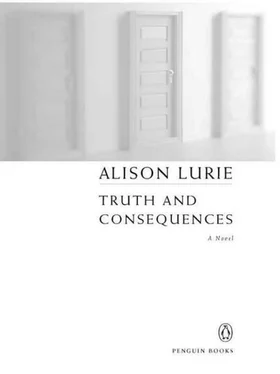“It’s not just my party, it’s yours too,” Jane said, her sobs beginning to subside.
“Whatever.” Alan gave a sigh and moved toward the window. “I still don’t see why you had to have it here, though,” he said presently, looking down again at the lawn, over which the caterers were now distributing white plastic chairs.
“But we talked about it already, we agreed,” Jane said, now in almost a normal tone of voice. “We’re having it here so you don’t have to spend any more time socializing than is comfortable for you. You can come in and lie down whenever you feel tired.”
“I feel tired already,” said Alan. “I always feel tired.”
“You only need to put in an appearance—speak to the people on the Council, meet the other new Fellows—” Jane, now wearing a tan shirtwaist dress and low-heeled white sandals, came to look out of the window beside him. “Do you think the tables are too close together?” she asked.
He made no comment.
“And why are they setting the chairs in rows? We’re not having a lecture. I told them already—I’ve got to go down. Come whenever you can.”
Alan did not move. In fact, he understood very well why the Matthew Unger Center reception was being held at his house: it was not for his convenience, but because Jane was determined that he should appear at it, demonstrating proper gratitude for his faculty fellowship. She knew that if the party had taken place anywhere else he would probably have refused to come, or would have wanted to be driven home early. Or, possibly, he would have gotten drunk. Alcohol cut his pain, though only briefly, and if he drank enough to make any real difference he would begin to feel dizzy and sick and behave badly.
Alan was only minimally grateful for his fellowship. For one thing, he was convinced that it had been Jane’s idea, though she denied this. In the eagerness of his colleagues to recommend him he saw mainly self-interest, for it meant that they would not have to fill in when he was too ill to meet a class, and would not have to see or hear about his pain and disability. On the other hand, he was grateful that he would not have to see them so often and experience their condescending pity.
Alan Mackenzie was a proud man, and in the past his pride had been of the sort known as “proper,” meaning that it had been well grounded in fact. It was grounded, for example, in his professional success, his health and good looks and athletic prowess; his attractive, affectionate, and intelligent wife; and his beautiful hundred-and-fifty-year-old house with its view of the lake. He had never called attention to these advantages—rather, he often spoke freely and humorously of his disadvantages: his lack of skill at golf, his failure to graduate from Yale with honors. Nevertheless, one or two envious friends and colleagues had sometimes mockingly referred to him as The Mackenzie, as if he were a Scottish clan chieftain. Now, of course, it was no longer necessary for him to deflect envy, since his friends and colleagues pitied rather than en-vied him.
The move to the Unger Center last week had been difficult. Jane and a team from Buildings and Grounds had packed and transported Alan’s books and papers, his computer and printer, and the drafting table he now used as a desk because he could not sit down to work. But he had had to select what was to be moved and organize the packing and unpacking. Presently, becoming impatient with the process, he had joined in, and had wrenched his shoulder again.
And even after everything was in place at the Center Alan hadn’t been able to get down to work. It was really too soon to start his book on religious architecture in America: his research wasn’t complete. Nearly half the buildings he wanted to discuss hadn’t been photographed right, and until he got well they never would be. If he ever got well. “But you can write up the material you have, can’t you?” Jane had asked. She didn’t understand that it didn’t work that way. The ideas and the research had to come first, then the outline, and then finally the writing.
Alan had always been interested in religion, once maybe too interested for his own good. But his main feeling now was relief that he had gotten over his early beliefs at college. If he still had faith he would have had to consider the spiritual meaning of the last sixteen months of severe, unrelenting pain. Was he being punished, and if so, for what? His life had not been blameless, but he had never been guilty of murder or plagiarism, never cheated on his taxes. He had not stolen anything since sixth grade, and it was years since he had committed adultery. On the other hand, he had not been so good that God would have been tempted to test his faith as he had Job’s.
Outside, the lawn was beginning to fill with guests, among whom presumably were the four other Fellows, whom Alan had not yet met. Sighing, he took up his cane and went down to join them. I’ll give it half an hour, Jane will have to be satisfied with that, he decided, clenching his teeth as he descended the staircase, one agonizing step at a time.
Twenty-five minutes later he had drunk two glasses of semi-alcoholic pink grapefruit punch, which only dulled the pain slightly. He had eaten too much Brie and crackers, spoken to the five members of the Humanities Council and three of their wives, and met three of the four other Fellows. Only Delia Delaney, this year’s star, was missing, and already her absence was beginning to be unfavorably commented on. From time to time Alan had observed Jane looking at him, her expression a mixture of encouragement and concern, and given her a small, ironic nod or wave. See? I’m doing what you wanted me to do, okay? it conveyed.
His back hurt worse and worse. He was about to excuse himself, and had turned to set down his empty plastic wineglass, when he saw an extraordinarily beautiful woman approaching. She was tall and fair, with masses of heavy red-gold hair, elaborately arranged in a series of braids and puffs and tendrils in the manner of Botticelli’s Simonetta , whom she strongly resembled.
“You must be Alan Mackenzie, who’s won all those prizes,” she said. Her voice was low, vibrating, breathy, with a warm Southern accent; her gauzy white dress was cut low, revealing full rose-pink breasts.
“So they tell me,” he admitted. It was true that two of his books, both now out of print, had been given awards.
“I’m Delia Delaney.” She smiled and looked up at him,
Of course, Alan almost said. He had seen a black and white photo somewhere, but it hadn’t revealed Delia’s spectacular coloring, including the satiny rose-flushed skin and the silver-gray eyes that matched her lacy shawl.
“I’m so happy to be here.” She sighed as if with actual happiness. “And now I want to see your famous folly, I’ve heard so much about it.”
“That’s it, over there.” Alan pointed to where, beyond the last curve of the flower bed, a gray stone arch was partly visible. “Help yourself.”
“But I want you to show it to me.” Delia put a warm hand on his arm.
Phrases of polite but honest refusal passed through Alan’s mind. I’m sorry, but I have a bad back, I can’t walk that far . I was just about to go lie down . But pride and good manners and Delia’s touch on his arm outweighed them, and he allowed himself to be led painfully down the lawn toward the miniature triumphal arch he had constructed three years ago to celebrate the publication of British Ruins and Follies . He had to admit that it still looked good—maybe even better now that ivy covered one side of the arch and a velvety dark-green moss had spread over the lowest stones.
“But I know it!” Delia exclaimed, laughing. “It’s the arch in Washington Square, isn’t that right?”
Читать дальше







![Кэмерон Доки - Правда и ее последствия[Truth and Consequences]](/books/79610/kemeron-doki-pravda-i-ee-posledstviya-truth-and-con-thumb.webp)




